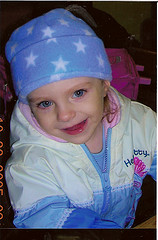
flickr.com/sweet_child_of_mine
Bed wetting has been a problem spread widely among millions of children and has also been a cause of problem for parents. Parents try all kinds of methods possible, even alternative methods. What parents must know is that bed wetting is not really considered a problem until it has become happening regularly.
Once the parents decide to go seek a doctor’s help, the quest for a diagnosis begins. The doctor will ask for any bed wetting history in the child’s family. Medical complications at birth of the child will also be asked, as well as whether the child has had problems his or her central nervous system.
A doctor will also ask if the child has ever had surgery or has had any injury in the abdominal area. Such injury may have affected the child’s bladder, kidneys, and genital area.
According to recent studies, an estimated twenty five percent of five year olds wet their beds. As these children grow up the bed wetters decrease by fifteen percent. For twelve year olds, eight percent of the males and four percent of the females wet their beds. Approximately around only one to three percent of teenagers are bed wetters.
Bed wetting, or enuresis, is divided into two kinds: Primary enuresis and secondary enuresis. Primary enuresis is more common while an estimated fifteen to twenty percent of bed wetters suffer from secondary enuresis, which is often caused by stress.
A doctor distinguishes primary from secondary enuresis by asking at what age your child has suffered bed wetting. If your child has never had a dry night ever since, then your child is suffering from primary enuresis. Secondary enuresis means your child has already managed to be dry for six months or so but begins to wet the bed again.
Enuresis can also be considered complicated or uncomplicated. If your child suffers both daytime incontinence and nocturnal enuresis then your child’s bed wetting is uncomplicated. It is complicated if there is lower back or abdominal pain which can most likely be caused of a urinary track infection.
Constipation can also cause bed wetting. If constipation is the cause, your child simply needs more fiber in his or her diet.
Tagged with: children bed wetting • diagnose bed wetting
Filed under: Bed Wetting